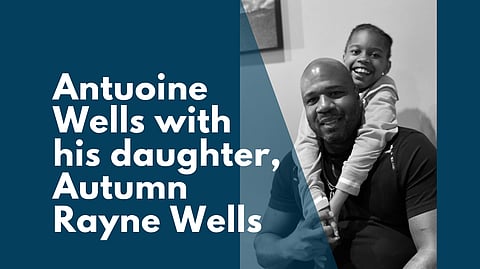
- Home
- Topic Areas
- Newsletter
- Podcast
- 100 Families Initiative
- About
- Connect
- Restore Hope

Antuoine Wells has lived both as a free man and behind bars. He's been raising a daughter as a single parent, working as a barber. He now has a new career as a long-haul truck driver through an initiative of Restore Hope Arkansas, which is helping people with troubled pasts access a great job with a starting pay of about $60,000.
Antuoine is one of 23 people who in the past year have earned a commercial driver’s license through a collaboration with the CDL Academy in Fort Smith. Graduates driving over-the-road are earning $1,200 to $2,000 per week, and the $6,500 training cost is covered through the Arkansas Division of Workforce Services if the student qualifies.
Antuoine, 44, says that finding good work after prison is challenging, “for the simple fact that once you have that label on your back, it’s hard. Doors slam. Most people go back to what they know.”
When Antuoine was 18, he ran with gangs on the streets of Little Rock. “I was trying to be an adult before it was time,” he says. During his senior year of high school, he rented an apartment, fell short on cash and made a bad decision.
“I was thinking I was doing everything right, but the responsibility was bigger than I was expecting,” he says. After being arrested for aggravated robbery, Antuoine spent seven years in prison. He doesn’t regret his lessons as they taught him about consequences.
When Antuoine was released from prison in 2003 at age 26, his focus was the “straight and narrow path,” he says. But he had no career or skills to speak of, whereas his friends had accrued multiple years of work history. He also lagged in maturity.
“Mentally I had to catch up. You have to learn to live. You’re learning to cope with society. About not blowing money. Fixing your credit; or learning what credit’s even about,” he says. “When you’re incarcerated, it’s 10:30 bedtime. Up by 6 or 6:30, go to work. The barracks for lunch. Eat dinner at 5, shower. Sit around until lights out. Your appearance may develop but your mind doesn’t.”
Antuoine often turned to his mother, big sister and godbrother for guidance.
“I reinvented myself. I can’t speak for all, but for me I didn’t want any more of that. I had to do everything in my power to stay out. I served my time, but when I came home, society still looked at me as if I was that person. You don’t ever make up for what happened; you just build where you start from, you build on to it to make it better.”
Antuoine found his first steady work when his godbrother encouraged him to attend barber school and they opened a shop together. Antuoine had a daughter in 2012. Then in 2018, the child’s mother was shot and killed in a parking lot while holding their daughter in her arms and in the presence of her three other children. Antuoine’s daughter also was shot but recovered. Antuoine was suddenly a full-time single parent, but he did have the ongoing support of both extended families.
“It was easier for me than some, because my daughter’s mom and I had always co-parented, and I have helped to raise two other children who didn’t have a father. I have a nice support system. But to this day my daughter still has some nightmares,” he says.
Last year, Antuoine was cutting a man’s hair and telling him about his experiences. The man was a caseworker with Restore Hope Arkansas’ 100 Families initiative, and he informed Antuoine about a program for training to earn a CDL. Antuoine had been interested in this work before, but the path seemed expensive and impractical with his barber’s schedule. He earned his CDL in October 2021.
Antuoine now drives a truck five days a week and is home each weekend, allowing him to continue serving barber clients. The extended family cares for his daughter during the week.
Increasingly, men and women in Arkansas with felony records and difficult histories are earning their CDLs, helping address a nationwide shortage of 80,000 drivers, a current estimate from the Commercial Vehicle Training Association.
Billy Pemberton, director of operations for the CDL Academy, says the trainees referred by 100 Families complete the 160-hour training in 4-6 weeks. Their backgrounds are not relevant and aren’t shared with the staff.
“My school is a second-chance school. We’re going to treat you like we do everyone else,” says Pemberton. When the hiring companies come in to recruit, some exclude those with troubled backgrounds. “But many say, ‘I don’t care what your past is; we want to see what your future is.’ Finding a job is no problem. With a CDL you’ll never want for a job.
“Even if a trainee decides life on the road isn’t for them, a CDL opens doors for other opportunities in the industry, such as working as a shipper, receiver, load planner or in a break-down department,” Pemberton says.
For Antuoine, the work makes for a good living, particularly as girls need pricier things as they get older, he laughs. “The training is not hard; when you put your all into it, then you get your all out of it. Now I have two skills I can take anywhere in the world and use them.”
Smart Justice is a magazine, podcast, and continuing news coverage from the nonprofit Restore Hope and covers the pursuit of better outcomes on justice system-related issues, such as child welfare, incarceration, and juvenile justice. Our coverage is solutions-oriented, focusing on the innovative ways in which communities are solving issues and the lessons that have been learned as a result of successes and challenges.
The podcast is available on all major podcasting platforms.
Subscribe to the Smart Justice newsletter.
